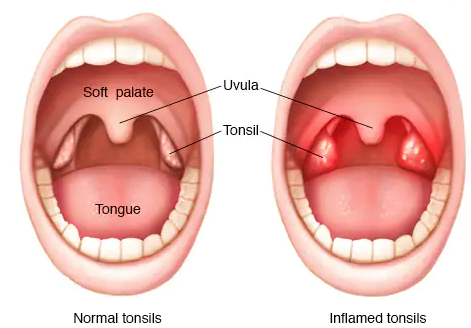Tonsillitis
This fact sheet is for people who have
This fact sheet provides general information. If you have specific concerns, speak to your healthcare professional for further information and advice.
Also available in: Arabic, Chinese (simplified), Chinese (traditional), Greek, and Korean
What is tonsillitis?
Tonsillitis is an inflammation of the tonsils that is usually caused by a viral infection. Less often it is caused by a bacterial infection.

Tonsillitis usually goes away after a few days. Simple treatment can ease symptoms. See a doctor if your symptoms are severe or do not get better quickly.
Symptoms
As well as a sore throat that can make swallowing painful, you may experience:
- a cough
- high temperature (fever)
- headache
- feeling tired
- swollen glands in your neck.
Your tonsils may swell and become red. Pus may appear as white spots on the tonsils. Symptoms typically get worse over two to three days and go away gradually. You should feel better within a week.
Causes
An infection causes tonsillitis. Most often it is a viral infection, but it can be a bacterial infection. Tonsillitis does not usually spread between people.
Treatment
- Mild tonsillitis doesn't normally need treatment. However, your doctor may suggest that you try to drink a certain amount of fluid to stay hydrated.
- Take pain relief, such as paracetamol or anti-inflammatory medicines like ibuprofen, if it is safe for you to do so.
- Use gargles, lozenges, and sprays to help soothe your sore throat.
- A short course of steroids may also be prescribed by your doctor.
Do I need an antibiotics?
No, because antibiotics don’t work on a virus and most throat and tonsil infections are caused by viruses. However, an antibiotic may be advised in certain situations or if bacteria is suspected to be the cause of your infection. Your doctor may do a throat swab to check for a bacterium called streptococcus pyogenes.
Some situations where antibiotics are prescribed in tonsillitis include:
- infection is severe
- infection does not get better after a few days
- your immune system is not working properly
- you are from a population with a high incidence of acute rheumatic fever, for example, Aboriginal and Torres Strait Islander, an Australian living in rural or remote settings, Maori or Pacific Islander.
What is quinsy?
Quinsy is also known as peritonsillar abscess. Quinsy is not a common condition. Caused by a bacterial infection, it can develop as a complication of tonsillitis. A collection of pus (abscess) grows next to a tonsil.
- A quinsy usually appears on one side of the throat. It may follow tonsillitis or develop without tonsillitis.
- The tonsil on the affected side may be swollen or look normal but is pushed towards the middle of your throat by the abscess. Quinsy is painful and can make you feel very unwell.
- Changes in your voice, difficulty opening your mouth, not being able to swallow, or worsening pain may be signs of a quinsy.
Antibiotics may not be effective on their own. The pus often needs to be drained with a small procedure.
What to expect
You should seek urgent medical attention if you develop:
- difficulty in breathing or voice changes
- difficulty swallowing saliva
- difficulty opening your mouth
- severe pain, especially if the pain is mainly on one side of your throat
- a persistent high temperature.
Seeking help
In a medical emergency call an ambulance – dial triple zero (000). If you have any concerns, see your local doctor or healthcare professional. If this is not possible, return to the emergency department or urgent care centre.
For more information
Ask your GP or healthcare professional. You can also call healthdirect 24 hours a day on 1800 022 222 or visit healthdirect.gov.au.
| Evidence informed | Based on rapid evidence check of grey literature and, where there is no research, based on clinical expert consensus. |
|---|---|
| Collaboration | Developed in collaboration with the Agency for Clinical Innovation (ACI) Emergency Care Institute members. |
| Currency | Due for review: July 2027. |
Accessed from the Emergency Care Institute website